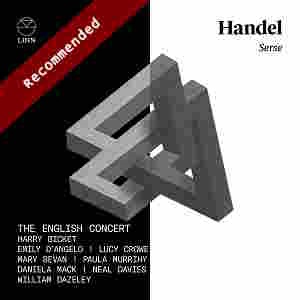
George Frideric Handel (1685-1759)
Serse, HWV40 (1737-38)
Serse – Emily D’Angelo (mezzo-soprano)
Arsamene – Paula Murrihy (mezzo-soprano)
Amastre – Daniela Mack (mezzo-soprano)
Romilda – Lucy Crowe (soprano)
Ariodate – Neal Davies (bass-baritone)
Atalanta – Mary Bevan (soprano)
Elviro – William Dazeley (baritone)
The English Concert/Harry Bickett (harpsichord)
rec. 2022, All Saints’ East Finchley, London
Italian libretto with English translation
Linn CKD709 [3CDs: 173]
I thought it might be interesting and instructive to compare this new recording with what might now be considered the vintage issue from 1979 on Sony by Jean-Claude Malgoire – the first on period instruments with pretensions to “authenticity” (ghastly term). It, too, presented the score complete with a starry cast headed by distinguished baroque-specialist mezzo Carolyn Watkinson, accompanied by the shimmering, sultry soprano of Barabara Hendricks and the fine, versatile German mezzo Ortun Wenkel, who was at the time ubiquitous, and four other distinguished co-singers. Malgoire is marginally slower than Bickett but there’s not much in it – and I have to say that Bickett’s direction is sometimes spritely to the point of breathlessness. On the other hand, Malgoire really overdoes the dotted-rhythm pointedness – so which do you prefer: rhythmic perkiness or relentless urgency? (I suspect that there is a happy medium…)
Malgoire also opted for a countertenor Arsamene in Paul Esswood in best voice as a substitute for the original castrato, whereas this latest version employs three mezzo-sopranos, somewhat limiting the scope for tonal variety – and neither Neal Davies or William Dazeley has quite the vocal richness of their predecessors for Malgoire – although Dazeley despatches his recitativo con spirito – nor does Lucy Crowe, for all her manifest gifts and purity of tone, exude as much sexiness as Hendricks. Nonetheless, Crowe is supremely accomplished as a Handel stylist and sings with huge assurance. Regarding the title role, rising Italo-Canadian mezzo star Emily D’Angelo is as alluring as Watkinson; again, there is nothing to choose between them for vocal accomplishment; Watkinson was long celebrated as a Handelian but D’Angelo’s fast vibrato and trenchant, burnished lower register are also a delight. In general, Malgoire gives his singers much more space and time to caress their vocal lines; the contrast is most striking in arias such as Romilda’s “Và godendo”; they sound like different pieces of music in the two recordings, yet both are beautifully sung. There is less of a disparity in arias such as Xerxes’ “Io le dirò”. Differences are minimal, too, in the performances of Ortrun Wenkel and Daniela Mack; both deal more than competently with their divisions and sing with spirit and velvety tone. Mack is especially impressive in her Act II aria ”Or che siete”. D’Angelo’s delivery of Xerxes’ concluding aria is certainly more urgent and ardent than Watkinson’s adept but considerably less thrilling account, but both offer wonderful singing.
Revisiting this opera in both recordings has also reminded me of how beautiful the music is, making its initial failure – closed after five performances – all the more inexplicable. It is no less alluring than Handel’s much earlier smash hit, Rinaldo, but maybe its innovative mix of genres threw audiences for a loop.
I cannot in all conscience say that anyone in possession of the old Malgoire recording should jettison it in favour of this latest version – that has too many merits, not least generally more seductive singing with the exception of the eponymous lead role – as both are equally superb and do honour to the invention of Handel’s music, although I can understand why a prospective punter might opt for Bickett’s more alert and urgent direction; personally, I still prefer Malgoire’s more affectionate approach while acknowledging the superior energy of this latest recording, whose main attraction is the beauty of Emily D’Angelo’s Serse. In many ways, she reminds me of mezzos of yesteryear and special character such as Tatiana Troyanos and Lorraine Hunt-Lieberson and I am sure there is much more to come from her.
The sound is ideal and the playing from the English Concert entirely secure – no wheezing or whining but flawless intonation and precision. Nobody wishing to become acquainted with this lovely music will regret the purchase.
Ralph Moore
Help us financially by purchasing from





















